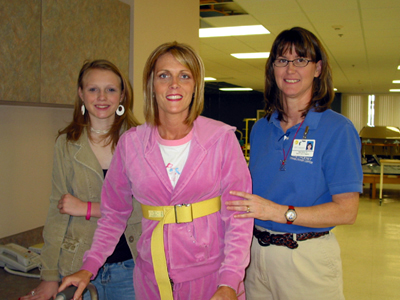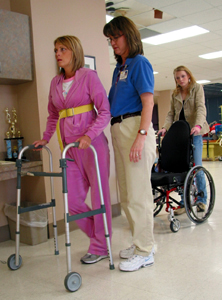JACKSON, Miss.—It was the scariest Halloween ever and the happiest New Year by far.
That’s how 36-year-old Hollie Harvey sums up a holiday season that has taught the Mendenhall mother of three to treat each new day as a gift. “I’m thankful to be alive,” she said. “I look at things in a whole new light.”
Harvey’s perspective was changed by a chain of events that began when her husband Tim hitched a hay trailer to his father-in-law’s Chevrolet Silverado and took family and friends on an old-fashioned Halloween hayride.
The family had begun the tradition the year before, and Harvey remembers being “happy and excited” as she sat on the truck’s tailgate cuddling her 5-year-old son Hooks. Then came a small bump and the simultaneous snapping of both tailgate cables.
When their perch plummeted, Harvey tossed Hooks out of harm’s way. She slid under the trailer’s left wheel, and as it rolled over her torso, the impact punctured a lung and broke six ribs, a shoulder blade and two vertebrae in her back.
Harvey heard her bones crack and her children scream, yet she never panicked. “I couldn’t breathe and I knew I was paralyzed, but I was as calm as if I was lying on the beach,” she said. “I felt God was there with me and he was going to use me.”
As she makes her comeback at Methodist Rehabilitation Center in Jackson, Harvey’s purpose may well be to prove what’s possible when you’ve got God, gumption and a good medical team on your side. Despite a surgeon’s predictions that she might never walk again, Harvey is back on her feet.
It’s a far cry from how she arrived at Methodist on Nov. 9. “I couldn’t move anything,” she said. “I cried all the way over to Methodist I was so scared.”
But as soon as she hit the therapy gym, Harvey learned there was no time for tears. She had work to do. “People come in here thinking they’re sick and we don’t give them any slack,” said Methodist physical therapist Mary Smith.
“These therapists know exactly how to treat you,” Harvey said. And she took pride in rising to their challenges. “When they would tell me to do 10 reps, I would do 20,” Harvey said. “I wanted to be able to kick a ball with my children (Hooks, 5; Anna Grace, 7; and Honey Beth, 12). That was my motivation.”
Although she’s a registered nurse at River Oaks Hospital in Flowood, Harvey admits she had a lot to learn about the realities of rehab. While Smith kept telling her to “take the abilities you have today and work with that,” Harvey wanted to skip past the fundamental exercises designed to build balance and endurance.
“I thought they were a waste of my time,” she said. “I thought: What has this got to do with me walking? Then I realized each one built on the other and if I was going to walk, I had to sit first.”
Harvey’s spinal cord injury was classified as incomplete, meaning there was a chance her paralysis might not be permanent. So Dr. Michael Winkelmann of Madison, a rehabilitation medicine physician at Methodist, prescribed a regimen of medication and therapy designed to foster a return of nerve function.
Just as importantly, said Harvey, he gave her the hope she could heal. “Every time I’ve done something new, Dr. Winkelmann has said: ‘I knew you could do it.’ He had faith in me from the beginning.”
Her family and friends offered their support, as well, filling her room with a 200–card “wall of inspiration” and making sure she was rarely alone.
Her brother John Hooks of Jackson even showed up every night to work her legs for an hour and a half. “He’s a lawyer, but he makes a good physical therapist,” Harvey said.
A week after arriving at Methodist, Harvey wiggled her right toe—the first in a series of returning movements. Soon, Methodist occupational therapist Bridgett Pelts had Harvey up and crawling, a therapy that strengthened her hips and knees and improved her coordination. Then it was time to stand. “I was scared to death,” Harvey said. “But it was the most awesome feeling.”
Next, Harvey took advantage of the hospital’s treadmill gait-training system. While her weight was supported in a harness, therapists helped “walk” her legs on the moving treadmill. “It gets the body used to the reciprocal motion of walking and seems to get things going neurologically,” Smith said.
By the time she left Methodist for the Christmas holidays, Harvey was doing laps around the therapy gym on a rolling walker. And Smith predicted she would eventually only need a cane for support.
Those were welcome words for Harvey, who has plans to use her amazing recovery as a testament to what God can do. “I told my mom I’m going to be walking and talking about God and how good he has been to me.”


